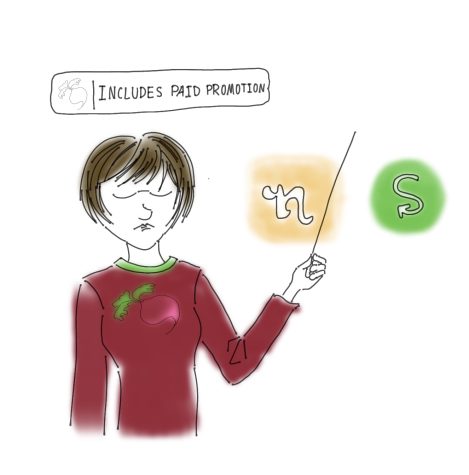Your donation will support the student journalists of West High School. Your contribution will allow us to purchase Scholarship Yearbooks, newsroom equipment and cover our annual website hosting costs.
Paid promotion enters public classrooms
April 20, 2022

Nectar, Rectangleroom, Talenttrade: West High students have become familiar with these brand names and more as the number of paid promotions in teachers’ lessons grows.
“I thought I was dreaming the first time I heard a pitch,” said Willow Taylor-Frank ’25. “My teacher had just told us what the math homework was and then suggested we get some extra practice using Intelligent. That was strange enough, but then she talked about it for at least two minutes.”
The idea spread throughout the staff, with the average student now encountering two sponsorships per day. Younger teachers have been especially likely to put sponsored content in their lessons. Monet Ghetter, who started teaching this year, was the first teacher to include paid promotion in their classes.
“The salary I get paid as a new teacher isn’t quite enough, so I asked an influencer friend of mine to put me in contact with the brands she’s worked with. I told them I had a loyal audience of 120 teenagers that watch me five days a week, and one of the brands offered me $40 for five days of promotion,” said Ghetter.
While the administration expressed disapproval of sponsorships and made attempts to stop them, teachers defended the practice by claiming they are just personal recommendations. Teachers also argued that the use of brands like Syntaxly, Interest Stream and Intelligent could be beneficial for students.
“While I’m against sponsored lessons, I could name a few students off the top of my head that could use a subscription to Bill Hygiene Group,” said mathematics teacher Pat Ryan. “Personally, I give students the option to sponsor my lessons themselves through the classroom’s Patreon page.”
The administration finally settled on forcing teachers to disclose any sponsored content in their lessons.
“It’s not ideal. I’d rather school be used for learning the curriculum than learning about brands,” said Principal Mitch Gross. “But, it was clear that wasn’t going to happen. At least now students know when a lesson is sponsored, which will allow them to make better decisions concerning the brand mentioned.”
